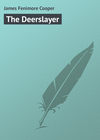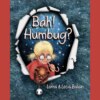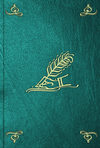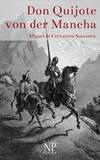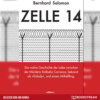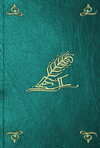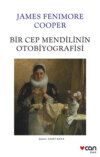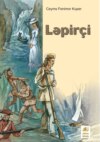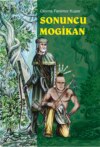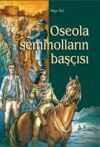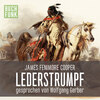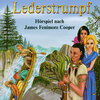Kitabı oku: «The Deerslayer», sayfa 17
During the interview between Deerslayer and the lad, a different scene took place in the adjoining room. Hetty had inquired for the Delaware, and being told why and where he remained concealed, she joined him. The reception which Chingachgook gave his visitor was respectful and gentle. He understood her character, and, no doubt, his disposition to be kind to such a being was increased by the hope of learning some tidings of his betrothed. As soon as the girl entered she took a seat, and invited the Indian to place himself near her; then she continued silent, as if she thought it decorous for him to question her, before she consented to speak on the subject she had on her mind. But, as Chingachgook did not understand this feeling, he remained respectfully attentive to any thing she might be pleased to tell him.
“You are Chingachgook, the Great Serpent of the Delawares, ar’n’t you?” the girl at length commenced, in her own simple way losing her self-command in the desire to proceed, but anxious first to make sure of the individual. “Chingachgook,” returned the Delaware with grave dignity. “That say Great Sarpent, in Deerslayer tongue.”
“Well, that is my tongue. Deerslayer, and father, and Judith, and I, and poor Hurry Harry — do you know Henry March, Great Serpent? I know you don’t, however, or he would have spoken of you, too.”
“Did any tongue name Chingachgook, Drooping-Lily”? for so the chief had named poor Hetty. “Was his name sung by a little bird among Iroquois?”
Hetty did not answer at first, but, with that indescribable feeling that awakens sympathy and intelligence among the youthful and unpracticed of her sex, she hung her head, and the blood suffused her cheek ere she found her tongue. It would have exceeded her stock of intelligence to explain this embarrassment, but, though poor Hetty could not reason, on every emergency, she could always feel. The colour slowly receded from her cheeks, and the girl looked up archly at the Indian, smiling with the innocence of a child, mingled with the interest of a woman.
“My sister, the Drooping Lily, hear such bird!” Chingachgook added, and this with a gentleness of tone and manner that would have astonished those who sometimes heard the discordant cries that often came from the same throat; these transitions from the harsh and guttural, to the soft and melodious not being infrequent in ordinary Indian dialogues. “My sister’s ears were open — has she lost her tongue?”
“You are Chingachgook — you must be; for there is no other red man here, and she thought Chingachgook would come.”
“Chin-gach-gook,” pronouncing the name slowly, and dwelling on each syllable — ”Great Sarpent, Yengeese tongue.”
[It is singular there should be any question concerning the origin of the well-known sobriquet of “Yankees.” Nearly all the old writers who speak of the Indians first known to the colonists make them pronounce the word “English” as “Yengeese.” Even at this day, it is a provincialism of New England to say “Anglish” instead of “Inglish,” and there is a close conformity of sound between “Anglish” and “yengeese,” more especially if the latter word, as was probably the case, be pronounced short. The transition from “Yengeese,” thus pronounced, to “Yankees” is quite easy. If the former is pronounced “Yangis,” it is almost identical with “Yankees,” and Indian words have seldom been spelt as they are pronounced. Thus the scene of this tale is spelt “Otsego,” and is properly pronounced “Otsago.” The liquids of the Indians would easily convert “En” into “Yen.”]
“Chin-gach-gook,” repeated Hetty, in the same deliberate manner. “Yes, so Hist called it, and you must be the chief.”
“Wah-ta-Wah,” added the Delaware.
“Wah-ta-Wah, or Hist-oh-Hist. I think Hist prettier than Wah, and so I call her Hist.”
“Wah very sweet in Delaware ears!”
“You make it sound differently from me. But, never mind, I did hear the bird you speak of sing, Great Serpent.”
“Will my sister say words of song? What she sing most — how she look — often she laugh?”
“She sang Chin-gach-gook oftener than any thing else; and she laughed heartily, when I told how the Iroquois waded into the water after us, and couldn’t catch us. I hope these logs haven’t ears, Serpent!”
“No fear logs; fear sister next room. No fear Iroquois; Deerslayer stuff his eyes and ears with strange beast.”
“I understand you, Serpent, and I understood Hist. Sometimes I think I’m not half as feeble minded as they say I am. Now, do you look up at the roof, and I’ll tell you all. But you frighten me, you look so eager when I speak of Hist.”
The Indian controlled his looks, and affected to comply with the simple request of the girl.
“Hist told me to say, in a very low voice, that you mustn’t trust the Iroquois in anything. They are more artful than any Indians she knows. Then she says that there is a large bright star that comes over the hill, about an hour after dark” — Hist had pointed out the planet Jupiter, without knowing it — ”and just as that star comes in sight, she will be on the point, where I landed last night, and that you must come for her, in a canoe.”
“Good — Chingachgook understand well enough, now; but he understand better if my sister sing him ag’in.”
Hetty repeated her words, more fully explaining what star was meant, and mentioning the part of the point where he was to venture ashore. She now proceeded in her own unsophisticated way to relate her intercourse with the Indian maid, and to repeat several of her expressions and opinions that gave great delight to the heart of her betrothed. She particularly renewed her injunctions to be on their guard against treachery, a warning that was scarcely needed, however, as addressed to men as wary as those to whom it was sent. She also explained with sufficient clearness, for on all such subjects the mind of the girl seldom failed her, the present state of the enemy, and the movements they had made since morning. Hist had been on the raft with her until it quitted the shore, and was now somewhere in the woods, opposite to the castle, and did not intend to return to the camp until night approached; when she hoped to be able to slip away from her companions, as they followed the shore on their way home, and conceal herself on the point. No one appeared to suspect the presence of Chingachgook, though it was necessarily known that an Indian had entered the Ark the previous night, and it was suspected that he had since appeared in and about the castle in the dress of a pale-face. Still some little doubt existed on the latter point, for, as this was the season when white men might be expected to arrive, there was some fear that the garrison of the castle was increasing by these ordinary means. All this had Hist communicated to Hetty while the Indians were dragging them along shore, the distance, which exceeded six miles, affording abundance of time.
“Hist don’t know, herself, whether they suspect her or not, or whether they suspect you, but she hopes neither is the case. And now, Serpent, since I have told you so much from your betrothed,” continued Hetty, unconsciously taking one of the Indian’s hands, and playing with the fingers, as a child is often seen to play with those of a parent, “you must let me tell you something from myself. When you marry Hist, you must be kind to her, and smile on her, as you do now on me, and not look cross as some of the chiefs do at their squaws. Will you promise this?”
“Alway good to Wah! — too tender to twist hard; else she break.”
“Yes, and smile, too; you don’t know how much a girl craves smiles from them she loves. Father scarce smiled on me once, while I was with him — and, Hurry — Yes — Hurry talked loud and laughed, but I don’t think he smiled once either. You know the difference between a smile and a laugh?”
“Laugh, best. Hear Wah laugh, think bird sing!”
“I know that; her laugh is pleasant, but you must smile. And then, Serpent, you mustn’t make her carry burthens and hoe corn, as so many Indians do; but treat her more as the pale-faces treat their wives.”
“Wah-ta-Wah no pale-face — got red-skin; red heart, red feelin’s. All red; no pale-face. Must carry papoose.”
“Every woman is willing to carry her child,” said Hetty smiling, “and there is no harm in that. But you must love Hist, and be gentle, and good to her; for she is gentle and good herself.”
Chingachgook gravely bowed, and then he seemed to think this part of the subject might be dismissed. Before there was time for Hetty to resume her communications, the voice of Deerslayer was heard calling on his friend, in the outer room. At this summons the Serpent arose to obey, and Hetty joined her sister.
Chapter XIV
“’A stranger animal,’ cries one,
‘Sure never liv’d beneath the sun;
A lizard’s body lean and long,
A fish’s head, a serpent’s tongue,
Its foot, with triple claw disjoined;
And what a length of tail behind!’”
James Merrick, “The Chameleon,” 11.21-26.
The first act of the Delaware, on rejoining his friend, was to proceed gravely to disencumber himself of his civilized attire, and to stand forth an Indian warrior again. The protest of Deerslayer was met by his communicating the fact that the presence of an Indian in the hut was known to the Iroquois, and that maintaining the disguise would be more likely to direct suspicions to his real object, than if he came out openly as a member of a hostile tribe. When the latter understood the truth, and was told that he had been deceived in supposing the chief had succeeded in entering the Ark undiscovered, he cheerfully consented to the change, since further attempt at concealment was useless. A gentler feeling than the one avowed, however, lay at the bottom of the Indian’s desire to appear as a son of the forest. He had been told that Hist was on the opposite shore, and nature so far triumphed over all distinctions of habit, and tribes and people, as to reduce this young savage warrior to the level of a feeling which would have been found in the most refined inhabitant of a town, under similar circumstances. There was a mild satisfaction in believing that she he loved could see him, and as he walked out on the platform in his scanty, native attire, an Apollo of the wilderness, a hundred of the tender fancies that fleet through lovers’ brains beset his imagination and softened his heart. All this was lost on Deerslayer, who was no great adept in the mysteries of Cupid, but whose mind was far more occupied with the concerns that forced themselves on his attention, than with any of the truant fancies of love. He soon recalled his companion, therefore, to a sense of their actual condition, by summoning him to a sort of council of war, in which they were to settle their future course. In the dialogue that followed, the parties mutually made each other acquainted with what had passed in their several interviews. Chingachgook was told the history of the treaty about the ransom, and Deerslayer heard the whole of Hetty’s communications. The latter listened with generous interest to his friend’s hopes, and promised cheerfully all the assistance he could lend.
“Tis our main ar’n’d, Sarpent, as you know, this battling for the castle and old Hutter’s darters, coming in as a sort of accident. Yes — yes — I’ll be actyve in helping little Hist, who’s not only one of the best and handsomest maidens of the tribe, but the very best and handsomest. I’ve always encouraged you, chief, in that liking, and it’s proper, too, that a great and ancient race like your’n shouldn’t come to an end. If a woman of red skin and red gifts could get to be near enough to me to wish her for a wife, I’d s’arch for just such another, but that can never be; no, that can never be. I’m glad Hetty has met with Hist, howsever, for though the first is a little short of wit and understanding, the last has enough for both. Yes, Sarpent,” laughing heartily — ”put ‘em together, and two smarter gals isn’t to be found in all York Colony!”
“I will go to the Iroquois camp,” returned the Delaware, gravely. “No one knows Chingachgook but Wah, and a treaty for lives and scalps should be made by a chief. Give me the strange beasts, and let me take a canoe.”
Deerslayer dropped his head and played with the end of a fish-pole in the water, as he sat dangling his legs over the edge of the platform, like a man who was lost in thought by the sudden occurrence of a novel idea. Instead of directly answering the proposal of his friend, he began to soliloquize, a circumstance however that in no manner rendered his words more true, as he was remarkable for saying what he thought, whether the remarks were addressed to himself, or to any one else.
“Yes — yes — ” he said — ”this must be what they call love! I’ve heard say that it sometimes upsets reason altogether, leaving a young man as helpless, as to calculation and caution, as a brute beast. To think that the Sarpent should be so lost to reason, and cunning, and wisdom! We must sartainly manage to get Hist off, and have ‘em married as soon as we get back to the tribe, or this war will be of no more use to the chief, than a hunt a little oncommon extr’ornary. Yes — Yes — he’ll never be the man he was, till this matter is off his mind, and he comes to his senses like all the rest of mankind. Sarpent, you can’t be in airnest, and therefore I shall say but little to your offer. But you’re a chief, and will soon be sent out on the war path at head of the parties, and I’ll just ask if you’d think of putting your forces into the inimy’s hands, afore the battle is fou’t?”
“Wah!” ejaculated the Indian.
“Ay — Wah — I know well enough it’s Wah, and altogether Wah — Ra’ally, Sarpent, I’m consarned and mortified about you! I never heard so weak an idee come from a chief, and he, too, one that’s already got a name for being wise, young and inexper’enced as he is. Canoe you sha’n’t have, so long as the v’ice of fri’ndship and warning can count for any thing.”
“My pale-face friend is right. A cloud came over the face of Chingachgook, and weakness got into his mind, while his eyes were dim. My brother has a good memory for good deeds, and a weak memory for bad. He will forget.”
“Yes, that’s easy enough. Say no more about it chief, but if another of them clouds blow near you, do your endivours to get out of its way. Clouds are bad enough in the weather, but when they come to the reason, it gets to be serious. Now, sit down by me here, and let us calculate our movements a little, for we shall soon either have a truce and a peace, or we shall come to an actyve and bloody war. You see the vagabonds can make logs sarve their turn, as well as the best raftsmen on the rivers, and it would be no great expl’ite for them to invade us in a body. I’ve been thinking of the wisdom of putting all old Tom’s stores into the Ark, of barring and locking up the Castle, and of taking to the Ark, altogether. That is moveable, and by keeping the sail up, and shifting places, we might worry through a great many nights, without them Canada wolves finding a way into our sheep fold!”
Chingachgook listened to this plan with approbation. Did the negotiation fail, there was now little hope that the night would pass without an assault, and the enemy had sagacity enough to understand that in carrying the castle they would probably become masters of all it contained, the offered ransom included, and still retain the advantages they had hitherto gained. Some precaution of the sort appeared to be absolutely necessary, for now the numbers of the Iroquois were known, a night attack could scarcely be successfully met. It would be impossible to prevent the enemy from getting possession of the canoes and the Ark, and the latter itself would be a hold in which the assailants would be as effectually protected against bullets as were those in the building. For a few minutes, both the men thought of sinking the Ark in the shallow water, of bringing the canoes into the house, and of depending altogether on the castle for protection. But reflection satisfied them that, in the end, this expedient would fail. It was so easy to collect logs on the shore, and to construct a raft of almost any size, that it was certain the Iroquois, now they had turned their attention to such means, would resort to them seriously, so long as there was the certainty of success by perseverance. After deliberating maturely, and placing all the considerations fairly before them, the two young beginners in the art of forest warfare settled down into the opinion that the Ark offered the only available means of security. This decision was no sooner come to, than it was communicated to Judith. The girl had no serious objection to make, and all four set about the measures necessary to carrying the plan into execution.
The reader will readily understand that Floating Tom’s worldly goods were of no great amount. A couple of beds, some wearing apparel, the arms and ammunition, a few cooking utensils, with the mysterious and but half examined chest formed the principal items. These were all soon removed, the Ark having been hauled on the eastern side of the building, so that the transfer could be made without being seen from the shore. It was thought unnecessary to disturb the heavier and coarser articles of furniture, as they were not required in the Ark, and were of but little value in themselves. As great caution was necessary in removing the different objects, most of which were passed out of a window with a view to conceal what was going on, it required two or three hours before all could be effected. By the expiration of that time, the raft made its appearance, moving from the shore. Deerslayer immediately had recourse to the glass, by the aid of which he perceived that two warriors were on it, though they appeared to be unarmed. The progress of the raft was slow, a circumstance that formed one of the great advantages that would be possessed by the scow, in any future collision between them, the movements of the latter being comparatively swift and light. As there was time to make the dispositions for the reception of the two dangerous visitors, everything was prepared for them, long before they had got near enough to be hailed. The Serpent and the girls retired into the building, where the former stood near the door, well provided with rifles, while Judith watched the proceedings without through a loop. As for Deerslayer, he had brought a stool to the edge of the platform, at the point towards which the raft was advancing, and taken his seat with his rifle leaning carelessly between his legs.
As the raft drew nearer, every means possessed by the party in the castle was resorted to, in order to ascertain if their visitors had any firearms. Neither Deerslayer nor Chingachgook could discover any, but Judith, unwilling to trust to simple eyesight, thrust the glass through the loop, and directed it towards the hemlock boughs that lay between the two logs of the raft, forming a sort of flooring, as well as a seat for the use of the rowers. When the heavy moving craft was within fifty feet of him, Deerslayer hailed the Hurons, directing them to cease rowing, it not being his intention to permit them to land. Compliance, of course, was necessary, and the two grim-looking warriors instantly quitted their seats, though the raft continued slowly to approach, until it had driven in much nearer to the platform.
“Are ye chiefs?” demanded Deerslayer with dignity — ”Are ye chiefs? — Or have the Mingos sent me warriors without names, on such an ar’n’d? If so, the sooner ye go back, the sooner them will be likely to come that a warrior can talk with.”
“Hugh!” exclaimed the elder of the two on the raft, rolling his glowing eyes over the different objects that were visible in and about the Castle, with a keenness that showed how little escaped him. “My brother is very proud, but Rivenoak (we use the literal translation of the term, writing as we do in English) is a name to make a Delaware turn pale.”
“That’s true, or it’s a lie, Rivenoak, as it may be; but I am not likely to turn pale, seeing that I was born pale. What’s your ar’n’d, and why do you come among light bark canoes, on logs that are not even dug out?”
“The Iroquois are not ducks, to walk on water! Let the pale-faces give them a canoe, and they’ll come in a canoe.”
“That’s more rational, than likely to come to pass. We have but four canoes, and being four persons that’s only one for each of us. We thank you for the offer, howsever, though we ask leave not to accept it. You are welcome, Iroquois, on your logs.”
“Thanks — My young pale-face warrior — he has got a name — how do the chiefs call him?”
Deerslayer hesitated a moment, and a gleam of pride and human weakness came over him. He smiled, muttered between his teeth, and then looking up proudly, he said — ”Mingo, like all who are young and actyve, I’ve been known by different names, at different times. One of your warriors whose spirit started for the Happy Grounds of your people, as lately as yesterday morning, thought I desarved to be known by the name of Hawkeye, and this because my sight happened to be quicker than his own, when it got to be life or death atween us.”
Chingachgook, who was attentively listening to all that passed, heard and understood this proof of passing weakness in his friend, and on a future occasion he questioned him more closely concerning the transaction on the point, where Deerslayer had first taken human life. When he had got the whole truth, he did not fail to communicate it to the tribe, from which time the young hunter was universally known among the Delawares by an appellation so honorably earned. As this, however, was a period posterior to all the incidents of this tale, we shall continue to call the young hunter by the name under which he has been first introduced to the reader. Nor was the Iroquois less struck with the vaunt of the white man. He knew of the death of his comrade, and had no difficulty in understanding the allusion, the intercourse between the conqueror and his victim on that occasion having been seen by several savages on the shore of the lake, who had been stationed at different points just within the margin of bushes to watch the drifting canoes, and who had not time to reach the scene of action, ere the victor had retired. The effect on this rude being of the forest was an exclamation of surprise; then such a smile of courtesy, and wave of the hand, succeeded, as would have done credit to Asiatic diplomacy. The two Iroquois spoke to each other in low tones, and both drew near the end of the raft that was closest to the platform.
“My brother, Hawkeye, has sent a message to the Hurons,” resumed Rivenoak, “and it has made their hearts very glad. They hear he has images of beasts with two tails! Will he show them to his friends?”
“Inimies would be truer,” returned Deerslayer, “but sound isn’t sense, and does little harm. Here is one of the images; I toss it to you under faith of treaties. If it’s not returned, the rifle will settle the p’int atween us.”
The Iroquois seemed to acquiesce in the conditions, and Deerslayer arose and prepared to toss one of the elephants to the raft, both parties using all the precaution that was necessary to prevent its loss. As practice renders men expert in such things, the little piece of ivory was soon successfully transferred from one hand to the other, and then followed another scene on the raft, in which astonishment and delight got the mastery of Indian stoicism. These two grim old warriors manifested even more feeling, as they examined the curiously wrought chessman, than had been betrayed by the boy; for, in the case of the latter, recent schooling had interposed its influence; while the men, like all who are sustained by well established characters, were not ashamed to let some of their emotions be discovered. For a few minutes they apparently lost the consciousness of their situation, in the intense scrutiny they bestowed on a material so fine, work so highly wrought, and an animal so extraordinary. The lip of the moose is, perhaps, the nearest approach to the trunk of the elephant that is to be found in the American forest, but this resemblance was far from being sufficiently striking to bring the new creature within the range of their habits and ideas, and the more they studied the image, the greater was their astonishment. Nor did these children of the forest mistake the structure on the back of the elephant for a part of the animal. They were familiar with horses and oxen, and had seen towers in the Canadas, and found nothing surprising in creatures of burthen. Still, by a very natural association, they supposed the carving meant to represent that the animal they saw was of a strength sufficient to carry a fort on its back; a circumstance that in no degree lessened their wonder.
“Has my pale-face brother any more such beasts?” at last the senior of the Iroquois asked, in a sort of petitioning manner.
“There’s more where them came from, Mingo,” was the answer; “one is enough, howsever, to buy off fifty scalps.”
“One of my prisoners is a great warrior — tall as a pine — strong as the moose — active as a deer — fierce as the panther! Some day he’ll be a great chief, and lead the army of King George!”
“Tut-tut Mingo; Hurry Harry is Hurry Harry, and you’ll never make more than a corporal of him, if you do that. He’s tall enough, of a sartainty; but that’s of no use, as he only hits his head ag’in the branches as he goes through the forest. He’s strong too, but a strong body isn’t a strong head, and the king’s generals are not chosen for their sinews; he’s swift, if you will, but a rifle bullet is swifter; and as for f’erceness, it’s no great ricommend to a soldier; they that think they feel the stoutest often givin’ out at the pinch. No, no, you’ll niver make Hurry’s scalp pass for more than a good head of curly hair, and a rattle pate beneath it!”
“My old prisoner very wise — king of the lake — great warrior, wise counsellor!”
“Well, there’s them that might gainsay all this, too, Mingo. A very wise man wouldn’t be apt to be taken in so foolish a manner as befell Master Hutter, and if he gives good counsel, he must have listened to very bad in that affair. There’s only one king of this lake, and he’s a long way off, and isn’t likely ever to see it. Floating Tom is some such king of this region, as the wolf that prowls through the woods is king of the forest. A beast with two tails is well worth two such scalps!”
“But my brother has another beast? — He will give two” — holding up as many fingers, “for old father?”
“Floating Tom is no father of mine, but he’ll fare none the worse for that. As for giving two beasts for his scalp, and each beast with two tails, it is quite beyond reason. Think yourself well off, Mingo, if you make a much worse trade.”
By this time the self-command of Rivenoak had got the better of his wonder, and he began to fall back on his usual habits of cunning, in order to drive the best bargain he could. It would be useless to relate more than the substance of the desultory dialogue that followed, in which the Indian manifested no little management, in endeavoring to recover the ground lost under the influence of surprise. He even affected to doubt whether any original for the image of the beast existed, and asserted that the oldest Indian had never heard a tradition of any such animal. Little did either of them imagine at the time that long ere a century elapsed, the progress of civilization would bring even much more extraordinary and rare animals into that region, as curiosities to be gazed at by the curious, and that the particular beast, about which the disputants contended, would be seen laving its sides and swimming in the very sheet of water, on which they had met.
[The Otsego is a favorite place for the caravan keepers to let their elephants bathe. The writer has seen two at a time, since the publication of this book, swimming about in company.]
As is not uncommon on such occasions, one of the parties got a little warm in the course of the discussion, for Deerslayer met all the arguments and prevarication of his subtle opponent with his own cool directness of manner, and unmoved love of truth. What an elephant was he knew little better than the savage, but he perfectly understood that the carved pieces of ivory must have some such value in the eyes of an Iroquois as a bag of gold or a package of beaver skins would in those of a trader. Under the circumstances, therefore, he felt it to be prudent not to concede too much at first, since there existed a nearly unconquerable obstacle to making the transfers, even after the contracting parties had actually agreed upon the terms. Keeping this difficulty in view, he held the extra chessmen in reserve, as a means of smoothing any difficulty in the moment of need.
At length the savage pretended that further negotiation was useless, since he could not be so unjust to his tribe as to part with the honor and emoluments of two excellent, full grown male scalps for a consideration so trifling as a toy like that he had seen, and he prepared to take his departure. Both parties now felt as men are wont to feel, when a bargain that each is anxious to conclude is on the eve of being broken off, in consequence of too much pertinacity in the way of management. The effect of the disappointment was very different, however, on the respective individuals. Deerslayer was mortified, and filled with regret, for he not only felt for the prisoners, but he also felt deeply for the two girls. The conclusion of the treaty, therefore, left him melancholy and full of regret. With the savage, his defeat produced the desire of revenge. In a moment of excitement, he had loudly announced his intention to say no more, and he felt equally enraged with himself and with his cool opponent, that he had permitted a pale face to manifest more indifference and self-command than an Indian chief. When he began to urge his raft away from the platform his countenance lowered and his eye glowed, even while he affected a smile of amity and a gesture of courtesy at parting.
